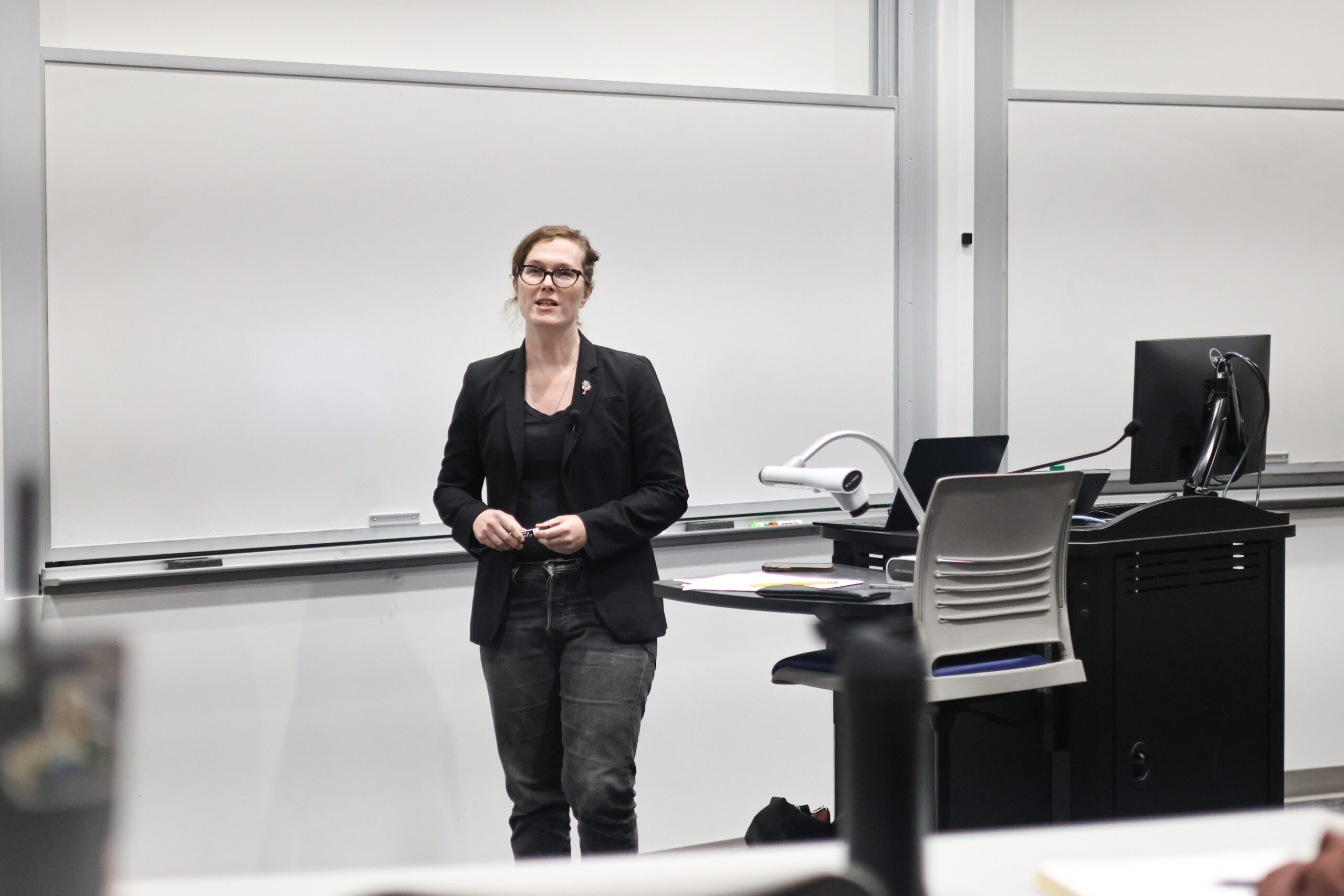Elana Redfield speaks to the Butler community about legislation regarding gender-affirming care. Photo by Jada Gangazha.
JENNA HARLAN | STAFF REPORTER | jhharlan@butler.edu
Elana Redfield, a federal policy director for the Williams Institute at the University of California, Los Angeles School of Law gave a presentation on Sept. 24 about access to and legislation regarding gender-affirming care. The presentation, hosted by the Race, Gender & Sexuality Studies program, included a discussion and Q&A on bans on receiving gender-affirming care and legislation targeting transgender, LGBTQIA+ and intersex people across the nation.
Gender-affirming care is a form of all-encompassing care intended to aid someone seeking to affirm or change their gender identity. This includes multiple forms of social expression, such as counseling, hormone therapy and gender-affirming surgery.
Ann Savage, a professor of critical communication and media studies, coordinated the event with assistance from a donation by Chuck Bright and Butler alumnus Andre Latia. Latia has donated on multiple occasions after Savage’s class on Donald Trump received nationwide media attention. These donations serve to ensure that Savage continues to have access to funding in order to help plan progressive activities.
“The event was hosted to educate people on the topic to anybody that has questions about gender-affirming care [for] anyone that needs to be validated in seeking gender-affirming care and the problems with the Indiana State House deciding medical decisions for residents,” Savage said. “I think Elana Redfield is … excellent. She’s well-versed and an expert [on] the topic.”
In the last several years, Indiana legislators have passed multiple laws restricting or outright banning gender-affirming care in the state. In 2023, the passing of Senate Bill 480 banned minors from receiving gender-affirming care and prohibited medical professionals from providing said care. According to the Human Rights Campaign, 26 states have passed bans on gender-affirming care.
Redfield’s talk specifically addressed gender-affirming care from a legal perspective. She talked about different organizations available to youth in Indiana, despite the current bans in the legislature. Redfield discussed what this type of legislature is, and what steps must be taken in order to change it.
Redfield used several Supreme Court cases as points of reference, breaking down some of the harmful stereotypes about transgender youth and how these may be weaponized to promote gender-affirming care bans.
First-year anthropology and psychology major Ginny Weykamp attended this event and deeply enjoyed the material.
“My biggest takeaway was that things can suck, but there’s always things we can do,” Weykamp said. “There’s always another option. There’s always an organization that you can go to for help, and people can make a really big difference on policies that affect a lot of people.”
There are plenty of organizations — such as Gender Nexus or Indy Pride — that support people in their community. Volunteering with a community organization, participating in protests and making opinions heard are just some of the ways that individuals can get involved.
The event was open to all Butler community members and qualified for Butler Cultural Requirement credit, which is a Core Curriculum requirement that encourages students to stay informed on the culture and world around them.
Mark Suchyta, a lecturer in the Department of Sociology and Criminology, highly recommended his students attend the presentation.
“I want students to get a lot of different perspectives, as opposed to just maybe what’s in the [textbook] or from me,” Suchyta said. “[The event] takes it beyond just the academic content to ‘This is going on [now].’ It affects people’s lives.”



